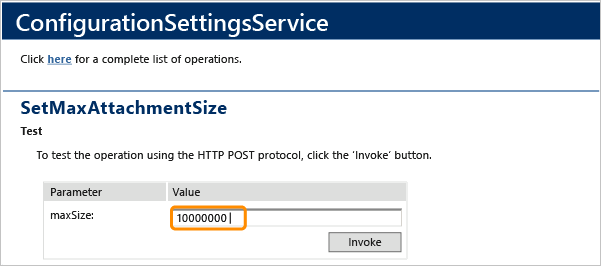Change the maximum attachment size for work items
Azure DevOps Server 2022 - Azure DevOps Server 2019 | TFS 2018 - TFS 2013
By default, Team Foundation Server limits the size of work item attachments to 4 MB. You can use the web service to increase the size of files you attach to up to 2GB.
If you're not a member of the Team Foundation Administrators group, get added as one.
Log on to the application-tier server for Azure DevOps Server.
In a supported web browser, open the following URL:
http://localhost:8080/tfs/DefaultCollection/WorkItemTracking/v1.0/ConfigurationSettingsService.asmx?op=SetMaxAttachmentSizeIf the project resides on a different project collection, specify the name of the collection in place of DefaultCollection.Enter the size in bytes, and then choose Invoke.

The maximum size you can specify is 2 gigabytes (or
2000000000).
Alternative solutions to increasing the attachment size
Increasing the attachment size increases the amount of data in storage and the time it takes to save a work item. To work around the size limit, add the attachment to source control and add a link in the work item to the source control file using the Versioned Item link type.
Federal Information Processing Standard (FIPS) exception
If you receive an error message similar to the one listed below, you may need to disable the FIPS service in order to avoid the exception. To learn more, see System cryptography: Use FIPS compliant algorithms for encryption, hashing, and signing" security setting effects in Windows XP and in later versions of Windows.
Application: csc.exe
Framework Version: v4.0.30319
Description: The process was terminated due to an unhandled exception.
Exception Info: System.InvalidOperationException
at System.Security.Cryptography.SHA256Managed..ctor()
Exception Info: System.Reflection.TargetInvocationException
at System.RuntimeMethodHandle.InvokeMethod(System.Object, System.Object[], System.Signature, Boolean)
at System.Reflection.RuntimeConstructorInfo.Invoke(System.Reflection.BindingFlags, System.Reflection.Binder, System.Object[], System.Globalization.CultureInfo)
at System.Security.Cryptography.CryptoConfig.CreateFromName(System.String, System.Object[])
at System.Security.Cryptography.SHA256.Create()
at Microsoft.CodeAnalysis.CommandLine.DesktopBuildClient.GetBasePipeName(System.String)
at Microsoft.CodeAnalysis.CommandLine.DesktopBuildClient.GetPipeNameForPath(System.String)
at Microsoft.CodeAnalysis.CommandLine.DesktopBuildClient.GetSessionKey(Microsoft.CodeAnalysis.CommandLine.BuildPaths)
at Microsoft.CodeAnalysis.CommandLine.BuildClient.RunCompilation(System.Collections.Generic.IEnumerable`1<System.String>, Microsoft.CodeAnalysis.CommandLine.BuildPaths, System.IO.TextWriter)
at Microsoft.CodeAnalysis.CommandLine.DesktopBuildClient.Run(System.Collections.Generic.IEnumerable`1<System.String>, System.Collections.Generic.IEnumerable`1<System.String>, Microsoft.CodeAnalysis.CommandLine.RequestLanguage, Microsoft.CodeAnalysis.CommandLine.CompileFunc, Microsoft.CodeAnalysis.IAnalyzerAssemblyLoader)
at Microsoft.CodeAnalysis.CSharp.CommandLine.Program.Main(System.String[], System.String[])
at Microsoft.CodeAnalysis.CSharp.CommandLine.Program.Main(System.String[])